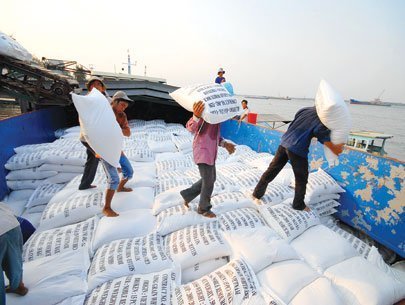VietNamNet Bridge – More than a half of the 3.4 million tons of rice exported
in the first six months of the year was high grade five percent broken rice.
However, the export prices of the products were at the lowest levels.

Indonesia, which was the biggest export market for Vietnam in 2011, still has
not intended to import rice. There has been no change with the Malaysian market,
while Vietnam has to compete fiercely with India when exporting rice to Africa.
According to Phong, China has emerged as a big rice consumer of Vietnamese rice.
Instead of Indonesia, which still kept silent about its rice import plan,
Vietnam has sold rice to China. To date, Vietnamese enterprises have signed the
contracts on exporting 1.2 million tons of rice to the country, of which 900,000
tons have been delivered.
Chinese market mostly consumes jasmine and 5 percent broken rice white rice.
However, Phong has advised Vietnamese exporters to be careful when doing
business with Chinese businessmen. Some of them have reportedly asked Vietnamese
enterprises to mix rice of different grades before selling to them – the move
which may lead to Vietnamese rice falling into disrepute in the world market.
The report by VFA showed that five percent broken rice accounted for nearly 50
percent of the total rice exports, increasing by 53 percent in comparison with
the same period of the last year. Vietnam has exported more high grade rice when
Thailand’s exports decreased.
Meanwhile, the exports of medium grade rice (15 percent of broken rice) dropped
sharply by 56 percent in comparison with the same period of the last year, just
accounting for 21 percent of the total exports, which has been attributed by the
lack of orders from Indonesia.
Especially, low grade rice just amounted to 9 percent of total exports, a
decrease of 44 percent in comparison with the same period of the last year,
because Vietnam has to compete with India, while the Philippines, the main
importer of low grade rice, has reduced imports.
However, despite the low demand from loyal clients, Vietnamese exporters still
have reasons to stay optimistic about the export in 2012. Nguyen Van Tien,
General Director of Angimex, said some new markets which are believed to be
choosy, have opened to Vietnamese rice, such as Japan, South Korea, Taiwan and
Hong Kong.
Vietnamese exporters have won the bid to export 30,000 tons of unpolished rice,
white rice and broken grains to South Korea. In 2011, South Korea invited for
bid to provide 300,000 tons of rice to the market, but no Vietnamese enterprise
won the bid.
Though Vietnam exported high grade rice, the export price was not high.
Vietnam’s five percent broken rice price is now at the lowest level on the
market, hovering around 415 dollars per ton, or 170 dollars per ton lower than
Thai rice. Especially, Vietnam’s rice was even cheaper than Pakistani and Indian
products, which had the prices of 465 dollars and 430 dollars per ton,
respectively.
Rice exporters have complained that they cannot make profits when exporting rice
at the low prices. Meanwhile, Phong of VFA said when Vietnam joins the big play
ground of the world, its businesses should understand that they should not
expect success in all affairs.
In related news, the government has released the decision to buy 500,000 tons of
summer-autumn rice for storage, instead of 1 million tons as initially planned.
Source: TBKTSG
- © Copyright of Vietnamnet Global.
- Tel: 024 3772 7988 Fax: (024) 37722734
- Email: evnn@vietnamnet.vn